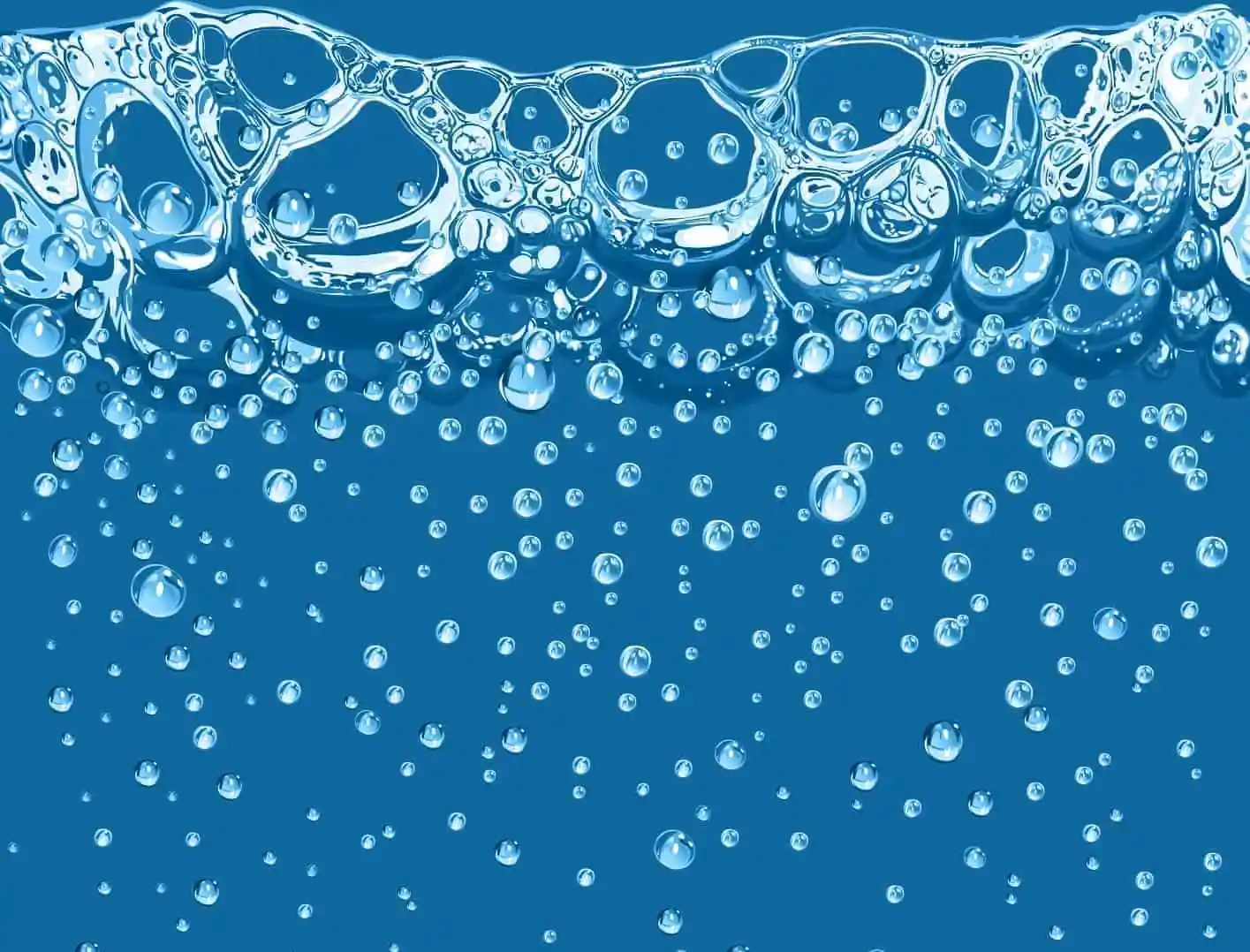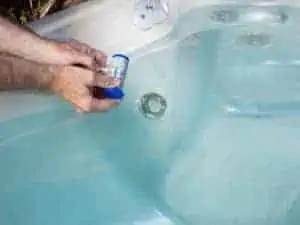If you want to elevate your spa experience, reduce stress, and soothe tension, we're taking…

Hot Tub Without Chemicals: 10 Chlorine Alternatives to Consider in 2025
Create a sanctuary-like atmosphere and enjoy natural hot tub relaxation with minimal chemicals. Discover all the ways to reduce chemical use, for a low maintenance, sustainable spa experience.
A hot tub can be a beautiful and luxurious addition to any home—but it’s important to remember that they require some upkeep. Hot tubs are the perfect breeding ground for bacteria and other microbes, so it’s essential to use some kind of sanitizer in order to keep them clean. But what if you’re looking for a way to sanitize your hot tub without using harsh chemicals? In this blog post, we’ll explore some of the different options available for chemical-free hot tub care.

Can you use a hot tub without chemicals?
Yes, you can use a hot tub without chemicals—but it’s important to note that this is not the safest option. Without sanitizing agents like chlorine or bromine, bacteria and other contaminants can quickly accumulate in your hot tub water, creating an unsafe environment for bathing.
Can you go in a hot tub without chlorine?
Yes, you can go in a hot tub without chlorine—but it is not recommended. Chlorine is the most common sanitizer used in hot tubs, and it’s essential for keeping your water clean and free of contaminants. Without chlorine, your hot tub could quickly become a breeding ground for bacteria and other microbes. Other sanitizing agents like bromine or biguanide can be used, but they are not as effective at killing bacteria and other contaminants.
What Happens If I Don’t Use Chemicals?
If you don’t use hot tub chemicals, your water can quickly become contaminated with bacteria and other contaminants. This could lead to skin irritation, eye irritation, or even more serious health issues in some cases. It’s also important to keep in mind that without regular sanitization, algae can quickly take hold and make your hot tub water cloudy and unpleasant.
Why don’t “natural” additives fully sanitize?
“Natural” additives like hydrogen peroxide, borax, and baking soda can help reduce bacteria in hot tub water, but they are not powerful enough to fully sanitize it. These substances should be used as a supplement to chlorine or other sanitizers, not a replacement for them.
How to Maintain a Hot Tub Without Chemicals
Maintaining a hot tub without chemicals is possible with the right systems and habits, allowing you to enjoy a no-chlorine hot tub that’s safe and inviting. Start by choosing a hot tub with built-in cleaning systems, like those from Epic Hot Tubs’ Wellis and Dynasty Spas, which use ozone, UV, and circulation pumps to minimize chemical needs. Regularly test your water’s pH and alkalinity to ensure balance, and clean filters weekly to prevent debris buildup. Showering before soaking reduces organic contaminants, and draining your spa every 3-4 months keeps water fresh. Combining natural hot tub chemicals like enzyme-based treatments with ozone or UV systems can create the best chemical-free hot tub treatment, though a minimal sanitizer may still be needed for high usage.
For those seeking a non chemical hot tub, incorporating a bromine alternative for hot tub sanitation can further enhance water quality without relying on traditional options. Regular maintenance routines, such as wiping down surfaces and monitoring water levels, also play a key role in sustaining a hot tub no chlorine environment. By focusing on these practices, you can achieve a hot tub without chlorine that remains clean and enjoyable for extended periods.
Exploring Natural Alternatives to Hot Tub Chemicals
If you’re dreaming of a chlorine-free hot tub or a no-chemical hot tub experience, natural alternatives to hot tub chemicals can help you achieve a gentler, more eco-friendly soak. At Epic Hot Tubs, we offer Wellis and Dynasty Spas equipped with advanced cleaning systems like ozone, UV, and circulation pumps, designed to reduce chemical use while keeping your water crystal clear. These built-in systems make it easier to enjoy a non-chlorine hot tub with minimal maintenance. Options like enzyme-based treatments break down organic matter naturally, while mineral-based systems soften water and reduce irritation, creating a spa-like experience without the harsh effects of traditional chemicals.
Ozone systems, for example, use oxygen to sanitize water, breaking down into harmless oxygen molecules, making them a top choice for a chemical-free hot tub treatment. UV systems zap bacteria with light, offering a non-toxic hot tub chemical solution, while enzyme treatments, like those lasting 12-18 months, are hypoallergenic and kind to your skin. These natural hot tub sanitizers work together to minimize the need for chlorine or bromine, letting you relax in a hot tub without chemicals—or at least with far fewer of them!
When considering natural hot tub chemicals, it’s helpful to explore options like a natural hot tub sanitizer that aligns with your preferences for sustainability. For those interested in a chemical free hot tub, integrating these methods can provide effective sanitation while preserving the relaxing essence of your spa time.
Hot Tub Without Chemicals? 10 Chlorine Alternatives to Consider
Each of these alternatives has its own unique benefits and drawbacks, depending on the hot tub owner’s preferences and needs. It’s essential to research and understand the options before making a decision to switch from traditional chlorine-based sanitizers.
- Non-chlorine shock: Non-chlorine shock is an oxidizer that helps remove contaminants from hot tub water. It is not a sanitizer, so it won’t necessarily provide a non-chlorine hot tub. However, it can help reduce the amount of chlorine needed to maintain clean and clear water.
- Salt systems: Salt systems generate chlorine from the process of electrolyzing salt. This eliminates the need for traditional chlorine or bromine products. However, some hot tub owners may not prefer this option, as the process of electrolyzing salt can still generate chlorine.
- Ultraviolet (UV) system: A UV system uses radiation to sanitize hot tub water as it passes through a tube with UV bulbs. UV systems can help eliminate contaminants and reduce the amount of chlorine or other chemicals required to maintain clean and clear water.
- Mineral-based systems: Mineral-based systems can reduce the amount of chlorine or other sanitizers required to maintain hot tub water. Some systems use silver, copper, or other minerals to inhibit bacterial growth, while others may use natural enzymes to break down organic contaminants.
- Ionizers: Ionizers release ions into the water to inhibit algae and bacteria growth. They can reduce the amount of sanitizer needed to keep the hot tub clean, but may not be effective on their own as a sanitizer.
- Ozonators: Ozonators inject ozone into hot tub water to reduce the need for sanitizer and the frequency of shocking the hot tub. However, ozonators are not registered sanitizers and still require some use of sanitizer to maintain clean and clear water.
- Enzyme-based treatment: Enzyme-based water treatment can reduce the number or amount of chemicals required to maintain hot tub water. This type of treatment breaks down organic contaminants in the water, making it easier for sanitizers to do their job.
- Biguanide: Biguanide is a gentle sanitizer that can be used as an alternative to chlorine or bromine in hot tubs. However, it requires the use of non-bromine and non-chlorine based shock, and some users may experience severe water conditions.
- Scale inhibitors: Scale inhibitors can help prevent the buildup of scale in hot tub water, which can reduce the effectiveness of sanitizers. By reducing scale buildup, sanitizers can work more effectively, and fewer chemicals may be required to maintain clean and clear water.
- PH balancers: PH balancers can help maintain the proper PH levels in hot tub water, which is essential for the effectiveness of sanitizers. By keeping the PH balanced, sanitizers can work more effectively, reducing the need for additional chemicals.
| Alternative | Chemical Use | Maintenance | Cost | Effectiveness |
| Non-chlorine shock | Low | Moderate | Low | Moderate (supplement only) |
| Salt systems | Moderate (produces chlorine) | Moderate | Moderate | High |
| Ultraviolet system | None | Low | High | Moderate (needs support) |
| Mineral-based system | Low | Low | Moderate | Moderate |
| Ionizers | Low | Moderate | High | Moderate |
| Ozonators | Low | High | High | High |
| Enzyme-based treatment | None | Low | Low | Low (supplement only) |
| Biguanide | Moderate | High | Moderate | High |
| Scale inhibitors | None | Low | Low | Low (supplement only) |
| PH balancers | None | Low | Low | Low (supplement only) |
Exploring hot tub chemical alternatives opens up possibilities for a more enjoyable soaking experience. Whether you’re aiming for a no chemical hot tub or simply reducing reliance on traditional methods, these options provide flexibility in maintaining water quality.
Chlorine Alternatives for Hot Tubs
For those searching for a chlorine alternative for hot tub use, several effective options exist that can keep your water clean without the typical chemical odor or skin irritation. Alternatives to chlorine in hot tub maintenance often include systems like ozone generators, which naturally oxidize contaminants, or UV light purifiers that neutralize bacteria on contact. A hot tub chlorine alternative such as mineral cartridges can also soften water while inhibiting microbial growth, making it a popular choice for sensitive skin.
Many owners prefer these chlorine alternatives for hot tubs because they align with a desire for non toxic hot tub chemicals, creating a gentler environment. Incorporating an alternative to chlorine in hot tub setups can transform your spa into a more natural retreat, especially when combined with regular filter cleaning and pH monitoring for optimal results.
Best Chemical Free Hot Tub Treatment
Finding the best chemical free hot tub treatment involves selecting methods that prioritize natural sanitation while ensuring water remains safe and clear. Enzyme-based cleaners stand out as a top option, breaking down oils and residues without harsh additives, ideal for a non chlorine hot tub options approach. Pairing this with an ozonator enhances effectiveness, as ozone acts as a powerful oxidizer that leaves no residue, supporting a truly chemical free hot tub experience.
For the best natural hot tub chemicals, consider mineral systems that release ions to control bacteria growth naturally. These treatments not only minimize maintenance but also promote softer water, making your soak more comfortable. Hot tub natural chemicals like these can be customized to fit your usage, ensuring a balanced and inviting spa without compromising on hygiene.
| Treatment | Key Benefit | Best For | Duration |
| Enzyme-based cleaners | Breaks down organics | Sensitive skin | Weekly |
| Ozonators | Oxidizes contaminants | Low maintenance | Continuous |
| Mineral systems | Inhibits bacteria | Soft water | 3-6 months |
| UV purifiers | Neutralizes microbes | High usage | Continuous |
Why Use an Alternative Hot Tub Sanitizer?
Hot tubs are a great way to relax and unwind, but the chemicals required to keep the water clean can cause irritation to the eyes and skin. For hot tub owners who want to reduce their environmental impact and avoid exposure to harsh chemicals, there are alternatives to traditional hot tub sanitizers.
One of the main reasons to consider using an alternative hot tub sanitizer is to avoid sensitivity to the chemical ingredients found in traditional hot tub disinfectants. Hot tub sanitizers have chemicals that can irritate the eyes, causing redness and discomfort. Additionally, the bleach effect from chlorine can cause the hot tub’s surfaces to deteriorate over time, leading to costly repairs.
Another issue that hot tub owners face is the strong chemical smell that can come from traditional sanitizers. This can be unpleasant and overpowering, making it difficult to relax and enjoy the hot tub experience.
Cost Savings for Low-Chemical Hot Tub Systems
Many hot tub owners are interested in reducing the cost of running and maintaining their hot tub, and seeking alternatives to traditional hot tub chemicals is one way to do so. While alternatives such as household bleach, vinegar, and baking soda have been suggested as low-cost alternatives to specialized hot tub chemicals, it’s important to carefully research and consider the benefits and drawbacks of each alternative before making a decision.
Additionally, it’s essential to understand the potential risks and consequences of using alternative substances on hot tub equipment and water quality. It’s always best to consult a hot tub sanitation expert before making any changes to your hot tub maintenance routine to ensure that you are not compromising the safety and effectiveness of your system.
How To Protect Yourself From The Microbes In A Hot Tub
The best way to protect yourself from the microbes in a hot tub is to use a sanitizing chemical like chlorine or bromine. It’s also important to follow good hygiene practices such as showering before entering the hot tub and avoiding any contact with contaminated water. Finally, it’s a good idea to check your pH levels regularly and make sure the water is in the proper range for safe bathing. By following these guidelines, you can ensure your hot tub remains a safe and pleasant environment for everyone to enjoy.
Basics of hot tub chemicals
The most common chemical used in hot tubs is chlorine. Chlorine is effective at killing bacteria, but it can also be harsh on your skin and eyes. If you’re looking for a gentler option, you might consider bromine. Bromine works in a similar way to chlorine, but it’s not as harsh on your skin and eyes. Other popular options include biguanide and quaternary ammonium compounds (or “quats”).
What Are Hot Tub Chemicals?
Hot tub chemicals are used to keep the water in your hot tub clean and free of bacteria, algae, and other contaminants. Hot tub chemicals come in powder or tablet form and should be added to the water according to specific directions. The most common hot tub chemicals are chlorine, bromine, biguanide, and quaternary ammonium.
How do Hot Tub Chemicals Work?
Hot tub chemicals work by disinfecting and sanitizing the water in your hot tub. Chlorine, bromine, and biguanide all act as oxidizers, which break down organic material such as sweat, body oils, and bacteria. Quaternary ammonium compounds (or “quats”) are used to neutralize odors and prevent algae growth.
Sanitation is the Most Important Thing
At Epic Hot Tubs, we believe that having a hot tub should be a fun and relaxing experience for everyone, without having to worry about the impact of harsh chemicals on the environment or your wallet. That’s why we recommend checking out the alternatives to traditional chlorine-based sanitizers for your hot tub, including mineral-based systems, to make your hot tub more natural and environmentally friendly.
However, with so many options available, it can be overwhelming to figure out which alternative is best for you. That’s where we come in – our friendly experts are always here to help guide you through the process of choosing and maintaining the best hot tub for your needs. So, whether you’re a seasoned hot tub owner or just starting out, let us help you make the most out of your hot tub experience – minus the harsh chemicals!

Richard Horvath
Richard has been in the hot tub & spa industry for years. As a long hot tub & swim spa owner himself, Richard has a passion for helping homeowners create their dream backyard.



